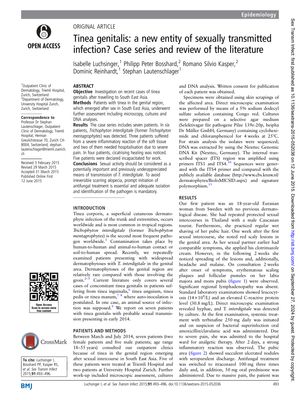Tinea Genitalis: A New Entity of Sexually Transmitted Infection? Case Series and Review of the Literature
June 2015
in “
Sexually Transmitted Infections
”

TLDR Sexual activity can spread T. interdigitale, needing quick antifungal treatment to avoid permanent scarring.
The study investigated seven cases of tinea genitalis following sexual activity in South East Asia. Six patients were found to have Trichophyton interdigitale, with three experiencing severe inflammatory reactions, and two requiring hospitalization. Four patients had cicatrising healing, and five were incapacitated for work. The study concluded that sexual activity could be a significant transmission route for T. interdigitale, emphasizing the need for prompt antifungal treatment to prevent irreversible scarring alopecia.




